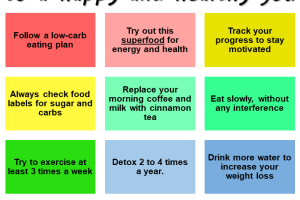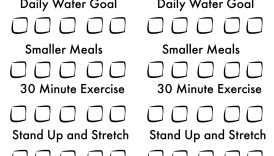Transform Your Life with a Proven Healthy Lifestyle Plan

Importance of Healthy Lifestyle
In today’s fast-paced world, the significance of maintaining a healthy lifestyle cannot be overstated. Several factors contribute to the need for a well-rounded approach to health, including increasing rates of chronic diseases, rising stress levels, and the prevalence of sedentary behavior. Adopting healthy habits can not only enhance physical wellbeing but also boost mental clarity and emotional stability. For example, a friend of mine made a concerted effort to change her diet and incorporate regular exercise into her routine. Over time, she noticed not just an improvement in her physical health, like weight loss and increased energy levels, but also a remarkable shift in her mood and outlook on life. The benefits of a healthy lifestyle extend beyond the individual, impacting families and communities. When one person in a household chooses to prioritize their health, it often inspires others to do the same, creating a ripple effect of positive lifestyle changes.
- Transform Your Life with a Proven Healthy Lifestyle Plan
- Importance of Healthy Lifestyle
- Benefits of Following a Proven Plan
- Understanding a Healthy Diet
- Nutrient-Rich Foods
- Meal Planning Strategies
- Regular Physical Activity
- Types of Exercise to Incorporate
- Creating a Sustainable Workout Routine
- Prioritizing Mental Wellbeing
- Stress Management Techniques
- Importance of Self-Care Practices
- Quality Sleep Routine
- Tips for Improving Sleep Quality
- Impact of Sleep on Overall Health
- Building Supportive Relationships
- Social Connections and Health
- Communicating Effectively in Relationships
Benefits of Following a Proven Plan
While the idea of adopting a healthier lifestyle can seem overwhelming, following a proven plan makes the process manageable and achievable. Here are some of the key benefits of having a structured approach:
- Clear Roadmap: A well-defined plan outlines the steps necessary to reach health goals, whether they pertain to nutrition, exercise, or mental wellbeing.
- Goal Setting: Establishing specific and measurable goals can enhance motivation and provide a sense of accomplishment as milestones are achieved.
- Support Systems: Plans often incorporate community or social networks, offering encouragement and accountability.
- Sustainability: A proven plan is typically designed for long-term success, helping individuals develop habits that can be maintained over time.
By embracing a structured lifestyle that emphasizes health, individuals position themselves for a future filled with vitality and resilience.
Understanding a Healthy Diet
Nutrient-Rich Foods
Building on the foundation of a healthy lifestyle, understanding the importance of a balanced diet is crucial. Nutrient-rich foods are those that provide a wealth of vitamins, minerals, and other beneficial compounds without excessive calories. Incorporating these foods can significantly enhance overall health. Some excellent examples of nutrient-dense foods include:
- Fruits and Vegetables: Fresh produce is packed with vitamins (like Vitamin C), antioxidants, and fiber. Aim for a rainbow of colors on your plate to maximize nutrients.
- Whole Grains: Instead of refined grains, choose whole grains like brown rice, quinoa, and whole wheat bread, which offer more fiber and nutrients.
- Lean Proteins: Foods such as chicken, fish, beans, and legumes can help build and repair tissues while providing essential amino acids.
To illustrate, a personal favorite of mine is a colorful quinoa salad loaded with diced bell peppers, black beans, and a squeeze of lime. Not only is it satisfying, but it’s also brimming with nutrients.
Meal Planning Strategies
Now that we understand what nutrient-rich foods to include, it’s essential to have a game plan for incorporating them into daily life. Effective meal planning creates structure and can prevent unhealthy choices when hunger strikes. Here are some practical strategies:
- Batch Cooking: Prepare large portions of healthy meals early in the week, making it easy to grab nutritious options on busy days.
- Create a Weekly Menu: Planning meals in advance helps to ensure a balanced diet, incorporating a variety of food groups.
- Keep It Simple: Choose recipes that are easy to prepare and require minimal ingredients, reducing time spent in the kitchen.
- Use a Grocery List: Stick to a shopping list based on your meal plan, minimizing impulse buys that can lead to less healthful choices.
By adopting these meal planning strategies, individuals can not only simplify their cooking process but also make healthier eating decisions that contribute to their overall well-being.
Regular Physical Activity
Types of Exercise to Incorporate
Transitioning from a healthy diet to regular physical activity is a natural progression in maintaining a balanced lifestyle. Engaging in various types of exercise can boost energy levels, enhance mood, and improve overall health. Diverse workouts also help prevent boredom and keep motivation high. Here are some key categories to consider incorporating into your routine:
- Cardiovascular Exercise: Activities such as running, cycling, and swimming increase heart rate and improve lung capacity. For instance, a morning jog or a cycling session can provide a refreshing start to the day.
- Strength Training: Using weights or resistance bands can help build muscle and increase metabolism. My partner and I enjoy going to the gym together, where we focus on different muscle groups through structured workouts.
- Flexibility and Balance: Practices like yoga and Pilates not only enhance flexibility but also promote mindfulness and stress relief. A weekly yoga class can be a serene way to unwind after a hectic week.
Creating a Sustainable Workout Routine
While it’s essential to incorporate various types of exercise, the key is to create a sustainable workout routine that fits seamlessly into daily life. Here are some practical tips to achieve this:
- Set Realistic Goals: Start with achievable targets, like exercising three times a week, to build confidence and momentum.
- Find Enjoyable Activities: Choose workouts that you genuinely enjoy. This could be anything from dance classes to hiking because enjoyment leads to consistency.
- Schedule Your Workouts: Just like any important appointment, block off time in your schedule for workouts. Treat this time as sacred.
- Listen to Your Body: Pay attention to how your body feels and adjust your routine accordingly. Rest days are essential for recovery and avoiding burnout.
Through a structured approach and a focus on enjoyment, individuals can create a sustainable workout routine that enhances their physical activity and nourishes their body and mind.
Prioritizing Mental Wellbeing
Stress Management Techniques
As we shift our focus from physical exercise to the equally crucial aspect of mental wellbeing, it becomes clear that managing stress is vital for a balanced life. Stress can silently creep in, affecting not only our mental state but also our physical health. Therefore, employing effective stress management techniques can make a significant difference. Here are a few strategies that have proven successful for many:
- Mindfulness and Meditation: Taking a few minutes each day to practice mindfulness or meditation can foster a sense of calm. For example, I often find peace by dedicating just ten minutes each morning to deep breathing exercises, which sets a positive tone for my day.
- Physical Activity: Interestingly, the benefits of physical exercise extend beyond physical health; it also helps reduce stress levels by releasing endorphins. Engaging in activities like yoga or even a brisk walk in nature can alleviate anxiety.
- Time Management: Breaking down tasks and prioritizing them can diminish feelings of overwhelm. Creating a to-do list can help you stay organized and focused.
Importance of Self-Care Practices
Equally important in the pursuit of mental wellbeing is the concept of self-care. Establishing self-care practices is not just a luxury; it’s a necessity for fostering resilience against life’s stresses. Here’s why self-care matters and how to incorporate it into your daily routine:
- Recharge and Refocus: Taking time for yourself allows for mental rejuvenation. Whether it’s enjoying a warm bath or reading a good book, consider these moments as vital to your emotional health.
- Establish Boundaries: Learning to say no is an act of self-respect. Protecting your time and energy ensures that you can focus on activities that uplift you.
- Connect with Loved Ones: Social interactions can be a powerful balm for stress. Simple things like catching up with a friend over coffee can significantly enhance your mood.
Ultimately, prioritizing mental wellbeing through stress management and self-care practices fosters a healthier, more balanced life. A thoughtful approach to both can significantly elevate one’s quality of life.
Quality Sleep Routine
Tips for Improving Sleep Quality
Having discussed the importance of prioritizing mental wellbeing, let’s delve into another crucial component that plays a pivotal role in overall health: quality sleep. A restful night’s sleep can work wonders for both the mind and body. To enhance sleep quality, here are some effective tips that anyone can incorporate into their routine:
- Establish a Consistent Schedule: Going to bed and waking up at the same time every day helps regulate your body’s internal clock. This consistency could mean going to sleep even on weekends, which I’ve found significantly improves my sleep quality.
- Create a Relaxing Bedtime Ritual: Engaging in calming activities before bed, such as reading or gentle stretching, can signal to your body that it’s time to wind down.
- Limit Screen Time: The blue light emitted from phones and computers can be disruptive. Aim to turn off screens an hour before bedtime. I’ve personally noticed a tremendous difference since I started reading a physical book rather than scrolling through my phone.
- Optimize Your Sleep Environment: Make your bedroom conducive to sleep by keeping it dark, cool, and quiet. Using blackout curtains and white noise machines can be particularly beneficial.
Impact of Sleep on Overall Health
The impact of sleep extends far beyond just feeling rested; it has profound effects on overall health. Quality sleep influences various bodily functions, including:
- Cognitive Functioning: A good night’s sleep enhances memory, decision-making, and problem-solving skills. Poor sleep, on the other hand, can lead to increased forgetfulness and foggy thinking.
- Emotional Health: Lack of sleep can exacerbate stress, anxiety, and depression. Studies have shown that individuals who are sleep-deprived are more prone to mood swings and irritability.
- Physical Health: Quality sleep supports the immune system and helps regulate weight. Chronic sleep deprivation can lead to serious health issues such as obesity and heart disease.
In essence, prioritizing a quality sleep routine is not just a personal choice but a fundamental aspect of maintaining overall health. By improving sleep quality, individuals can effectively enhance their mental clarity, emotional stability, and physical wellbeing.
Building Supportive Relationships
Social Connections and Health
As we transition from the importance of quality sleep to another critical element of a holistic lifestyle, let’s explore the role of supportive relationships. Strong social connections significantly contribute to emotional and physical health. Research consistently shows that individuals who maintain meaningful relationships tend to experience lower levels of stress and greater overall happiness. For example, a study illustrated that individuals with a close circle of friends can better cope with life’s challenges. Personally, I always feel more at ease when I chat with my friends after a long day; these interactions can feel like a breath of fresh air. Consider these benefits of nurturing social connections:
- Emotional Support: Having someone to talk to can lessen feelings of isolation and anxiety. It’s comforting to know that someone is there to listen.
- Healthier Choices: Friends often motivate one another to make healthier decisions. For instance, my running group not only encourages me to stay active but also keeps me accountable for my fitness goals.
- Longevity: Some studies suggest that strong social ties may even contribute to a longer life. It’s a vital reminder that our relationships can be as important as a good diet and regular exercise.
Communicating Effectively in Relationships
While building relationships is essential, effectively communicating within those relationships is equally important. Healthy communication fosters understanding and strengthens bonds. Here are some techniques for enhancing communication:
- Active Listening: Focus entirely on the speaker, making eye contact and nodding to show engagement. This practice not only fosters better conversations but also validates their feelings.
- Express Yourself Clearly: Share your thoughts and feelings openly while being mindful of your tone. I’ve learned that when I express my emotions without defensiveness, the conversation tends to be more productive.
- Seek Feedback: Encourage open dialogue by inviting feedback. Phrasing your questions like, “How do you feel about this?” can prompt a more open exchange.
- Manage Conflicts Wisely: When disagreements arise, approach them calmly and aim for resolution rather than winning the argument. Agreeing to disagree can be a peaceful solution.
By prioritizing social connections and improving communication skills, individuals can cultivate supportive relationships that greatly enhance their emotional and physical wellbeing. It’s a beautiful cycle where meaningful interactions foster joy, and healthy communication bolsters those connections even further.





